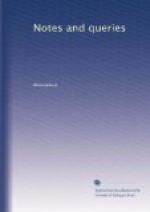Before we censure an author or editor, we should consult his own edition. He cannot be answerable for the errors of any other impression. Such, at least, is my notion of critical equity.
I shall now state the plain facts. Malone, in the first instance, printed the spurious declaration of John Shakspear in an imperfect state. (Plays and Poems of W.S., 1790, vol. i. part ii. p. 162.) He was soon afterwards enabled to complete it. (Ibid. vol. i. part ii. p. 330.) Steevens reprinted it entire, and without comment. (Plays of W.S., 1793, vol. ii. p. 300.) Now the editor of the Irish reimpression, who must have omitted to consult the edition of Steevens, merely committed a blunder in attempting to unite the two fragments as first published by Mr. Malone.
There was no audacious fabrication on the occasion—there is no mystery in the case! (No. 24. p. 386.) So, to stop the current of misconception, and economise space on future occasions, I venture to repeat a few words in suggesting as a canon of criticism:—Before we censure an author or editor we should consult his own edition.
BOLTON CORNEY.
* * * * *
REPLIES TO MINOR QUERIES.
Compendyous Olde Treatyse.—“F.M.” (No. 18. p. 277.) will find this tract reprinted (with the exception of the preface and verses) in Foxe’s Acts and Monuments; a portion once peculiar to the first edition of 1563, p. 452., but now appearing in the reprint of 1843, vol. iv. p. 671-76., which may be of some service in the absence of the original tract.
NOVUS.
Hordys (No. 5. p. 157.).—I have waited till now in hopes of seeing an answer from some more competent pen than my own to the Query as to the meaning of the word “hordys,” by your correspondent “J.G.;” but having been disappointed, I venture a suggestion which occurred to me immediately on reading it, viz. that “hordys” might be some possible or impossible derivation from hordeum, and applied “irreverently” to the consecrated host, as though it were no better than a common barley-cake.
Whether in those early days and in Ireland, the host was really made of barley, and whether “hordys” was a name given to some kind of barley-cake then in vogue, or (supposing my suggestion to be well founded) a word coined for the occasion, may perhaps be worthy of investigation.
A.R.
Kenilworth, April 5.
Eachard’s Tracts.—The Rev. George Wyatt, who inquires (No. 20. p. 320.) about Eachard’s Tracts, will probably get all the information he wants from the Life of Eachard prefixed to the collected edition of his Works in three volumes, which I am sorry I have not the means at present of referring to.
“I.O.,” to whom the last of the tracts is addressed, is Dr. John Owen.




